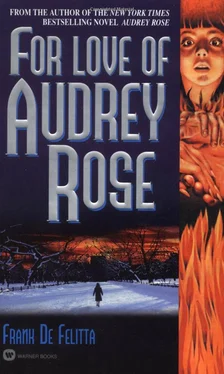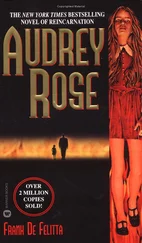“What are you talking about?”
“Janice,” he said in a voice which did not sound familiar, “on the fifteenth of the month, if there had been a clear sky and no wind—”
“There was a storm blowing.”
“Ivy could have stretched out her arms, cast her shadow onto the sand.”
Bill spread his arms, mimicking, but his body trembled with an unusual tension, and he closed his eyes until tears formed.
“And where her heart would be, in the shadow, carve the letter A. And Ivy would stare into it, unblinking, for seven minutes. And seven times the holy benediction would be uttered….”
“Please, darling, stop it!”
Bill leaned back, arched his spine, and called upward, to the heavens, beyond the heavens, in a voice deep from his diaphragm.
“Om ayuse samharakesvare hum phat!”
Janice covered her ears with her hands.
“Om ayuse samharakesvare hum phat!”
Bill’s eyes glazed triumphantly. He stood up straight again.
“And then Ivy would look up into the sky and see her after-image. If it was pale and white, she would not die. But if it was black, she was being consumed.”
Bill paused. His words came now curiously dry, abstract, devoid of emotion. In a desultory way, he riffled through the pages of The Book of the Dead, listless.
“But you didn’t know that, Janice,” he said.
“And what if I had known, Bill?”
He smiled, but only shrugged.
“In that case,” he said, “if it was black, there would have been counter-rituals. There are certain kinds of flasks. Reading from the texts. Crashing of the cymbals, drums, and lutes, and the sending away of the demons. You see, Janice, we could have ameliorated her fear, circumvented her untimely return.”
He turned slowly back to her. His smile remained, but now it was sad and demonic.
“The cycle would have stopped,” he said. “Now it only continues.”
A name, a date, and an address flashed through Janice’s mind. She turned away. She did not want to think what Bill would do if he ever found Juanita. She believed him capable of anything. Yet, she could not bring herself to confide in Dr. Geddes. Bill would crumble one final time, and forever, if she betrayed him.
The next day was Saturday, and Janice took the bus up Riverside Drive. She crossed to the northeast, just past the park, until she was in Spanish Harlem. Though it was cold, the day was ferociously bright, and it hurt her eyes to look down the crowded streets. Radios blared music out of the pawnshops. There was not another white person in view.
On 118th Street were a series of small grocery stores, a laundromat, and a Pentecostal church. Opposite them was an enormous block of public housing. Janice looked in vain for the numbers. If there was a 385, the house number had long ago been ripped from the door.
She crossed the street and went into the first entrance. A tattered sign read 200–300. The hall stank of mildew. Overhead were harsh, rubbery sounds, as though a child were ramming a wheeled toy repeatedly over a linoleum floor. Graffiti everywhere denoted death and crude love for whites. Janice walked slowly to a door down the hall and listened. A radio played disco music inside, the announcer speaking excitedly in a liquid Spanish.
She knocked.
When the door opened, a slight man with a pencil-thin mustache stood before her in his undershirt. He retreated, embarrassed before her, and then defiantly stood his ground.
“Is Mrs. Hernandez here?” she asked hesitantly.
He shook his head and prepared to close the door.
“Upstairs?” she asked.
He glared blankly at her.
“Um, donde es Senora Hernandez? ”
The man shrugged, smiled politely but firmly, and gently closed the door.
Just then, two boys, aged fifteen or sixteen, came up from the basement, carrying lead pipes. They stopped and stared at her.
To ease the awkwardness of being stared at, Janice asked, “Do you speak English?”
The taller of the two stepped closer, his hand fingering the rusted edges of the pipe.
“I’m looking for the Hernandez family,” Janice said.
The boys continued to stare at her, as though wondering what had brought her to this block of flats. The shorter of the two looked her up and down until she felt self-conscious.
“Hernandez,” Janice repeated.
“Upstairs,” said the tall one.
“What?”
“Upstairs. We take you.”
Janice did not like the way he said it, nor the way his friend or brother kept looking at her. The taller one pointed to the stairs and smiled.
“Come on,” he said. “We go upstairs.”
“Could you just tell me which floor?”
“No. You go. We go. We show you.”
“Yes,” seconded the other boy. “Hernandez family is upstairs.”
“No,” Janice said slowly. “I’ll go there myself.”
The taller boy stepped forward, a bit angry. “Luis. Go help the lady. Bring Mrs. Hernandez down.”
“Really,” she protested, “it’s not necessary.”
But the other boy was already climbing the stairs, two at a time. While Janice waited, curious, she noticed that the tall boy kept smiling at her.
“Luis bring Mrs. Hernandez,” he confided.
“I’m very grateful.”
After several minutes, two pairs of footsteps circled down the stairwell, coming down from at least the third floor. Luis appeared, casting an ambivalent glance at Janice, and behind him was a tall, black-haired woman, wiping her hands on a towel. The woman’s hair was so black, it gleamed an almost blue. She studied Janice closely, then braced herself.
“Yes? What you want?” she asked in an even voice.
“Are you Mrs. Hernandez?”
“What you want with my sister?” the woman asked suspiciously.
“I’d like to see Juanita.”
The woman’s features softened, then immediately hardened again.
“You’re from Welfare?” she said, casting anxious glances at Janice’s face, hands, and clothes.
“No, I’m a friend. That is, I’d like to be a friend.”
“I no understand.”
Janice smiled, and a small laugh of frustration escaped her.
“If I could explain, I would,” she said. Then, more slowly, “I want very much to see Juanita. It has to do with my own daughter.”
Puzzled, the woman wiped her hands, though they were certainly dry. She shrugged.
“You work for the city?” she asked, once again.
“No. I’m a writer,” she lied.
“Well, if you want to come up, follow me.”
The four of them went into the stairwell. The plaster showed in rough oblongs along the wall, where sharp implements had gouged holes and then enlarged them. At the first floor the two boys left, running down the corridor. Janice followed the woman into a narrower, darker stairwell.
“My sister not feel so well,” the woman said. “So you not stay a long time. Okay?”
“Yes, okay.”
On the fourth floor, the woman walked quickly, but soundlessly, down the cluttered corridor. A far door with a cracked glass window let in a gray, dirty light over the tricycle and boxes of woolen cloth left for unknown reasons in the middle of the hall. Crayon marks left long trails where a child had run the length of the corridor with first one color and then another.
Janice followed the woman into the doorway of a small apartment. They stood in the kitchen. On the stove an enormous aluminum pot bubbled with a thick sauce. Small laundry hung from white cord that led into the tiny living room. A crucifix hung on the wall.
“Rosa!”
A short woman, gray twined neatly into her black hair, came into the kitchen, shuffling on bedroom slippers. She stopped when she saw Janice.
For a long time, Janice looked at her, as though there might be some common bond between them. Then she realized it was foolish, and she smiled, extending her hand.
Читать дальше












